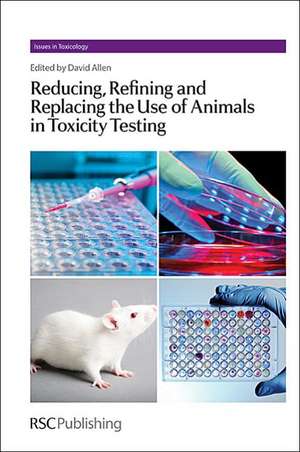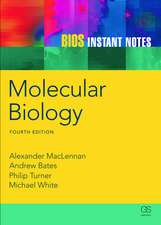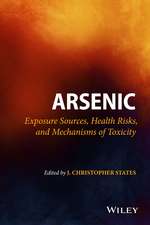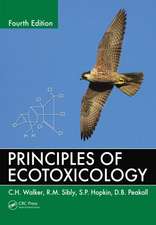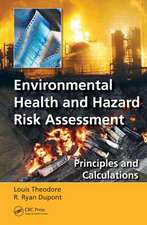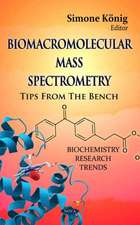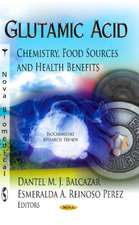Reducing, Refining and Replacing the Use of Animals in Toxicity Testing: Issues in Toxicology, cartea 19
Mike D Waters Editat de Dave Allen, Mike D Watersen Limba Engleză Hardback – 30 oct 2013
Din seria Issues in Toxicology
- 5%
 Preț: 1253.11 lei
Preț: 1253.11 lei - 5%
 Preț: 1326.01 lei
Preț: 1326.01 lei - 5%
 Preț: 1538.96 lei
Preț: 1538.96 lei - 14%
 Preț: 2480.57 lei
Preț: 2480.57 lei - 5%
 Preț: 1361.12 lei
Preț: 1361.12 lei - 9%
 Preț: 1031.61 lei
Preț: 1031.61 lei - 14%
 Preț: 1211.87 lei
Preț: 1211.87 lei - 14%
 Preț: 1357.63 lei
Preț: 1357.63 lei - 5%
 Preț: 1134.46 lei
Preț: 1134.46 lei - 14%
 Preț: 1314.76 lei
Preț: 1314.76 lei - 5%
 Preț: 1495.86 lei
Preț: 1495.86 lei - 5%
 Preț: 1508.68 lei
Preț: 1508.68 lei - 5%
 Preț: 1551.74 lei
Preț: 1551.74 lei - 5%
 Preț: 1268.59 lei
Preț: 1268.59 lei - 5%
 Preț: 1537.11 lei
Preț: 1537.11 lei - 5%
 Preț: 1526.14 lei
Preț: 1526.14 lei - 5%
 Preț: 2534.03 lei
Preț: 2534.03 lei - 5%
 Preț: 1537.11 lei
Preț: 1537.11 lei - 5%
 Preț: 1440.92 lei
Preț: 1440.92 lei - 14%
 Preț: 1230.53 lei
Preț: 1230.53 lei - 5%
 Preț: 1341.43 lei
Preț: 1341.43 lei - 14%
 Preț: 1387.76 lei
Preț: 1387.76 lei - 5%
 Preț: 1201.01 lei
Preț: 1201.01 lei - 14%
 Preț: 1218.32 lei
Preț: 1218.32 lei - 14%
 Preț: 949.86 lei
Preț: 949.86 lei - 5%
 Preț: 1300.31 lei
Preț: 1300.31 lei - 5%
 Preț: 1087.58 lei
Preț: 1087.58 lei - 5%
 Preț: 1073.50 lei
Preț: 1073.50 lei - 14%
 Preț: 1136.73 lei
Preț: 1136.73 lei - 5%
 Preț: 1337.71 lei
Preț: 1337.71 lei - 5%
 Preț: 642.03 lei
Preț: 642.03 lei - 14%
 Preț: 1092.34 lei
Preț: 1092.34 lei - 5%
 Preț: 1045.29 lei
Preț: 1045.29 lei - 5%
 Preț: 1054.02 lei
Preț: 1054.02 lei - 5%
 Preț: 1158.47 lei
Preț: 1158.47 lei - 9%
 Preț: 1242.36 lei
Preț: 1242.36 lei - 5%
 Preț: 1440.62 lei
Preț: 1440.62 lei - 9%
 Preț: 1239.74 lei
Preț: 1239.74 lei - 9%
 Preț: 1034.00 lei
Preț: 1034.00 lei - 9%
 Preț: 1244.07 lei
Preț: 1244.07 lei - 9%
 Preț: 1169.42 lei
Preț: 1169.42 lei - 9%
 Preț: 1172.99 lei
Preț: 1172.99 lei - 9%
 Preț: 1031.38 lei
Preț: 1031.38 lei - 9%
 Preț: 1032.48 lei
Preț: 1032.48 lei - 5%
 Preț: 833.22 lei
Preț: 833.22 lei
Preț: 1404.09 lei
Preț vechi: 1632.67 lei
-14% Nou
268.67€ • 280.51$ • 222.36£
Carte disponibilă
Livrare economică 15-29 martie
Specificații
ISBN-10: 1849736529
Pagini: 362
Ilustrații: Illustrations
Dimensiuni: 164 x 238 x 29 mm
Greutate: 0.72 kg
Editura: Royal Society Of Chemistry
Seria Issues in Toxicology
Notă biografică
Cuprins
Textul de pe ultima copertă
Toxicity testing is used to assess the safety or hazards presented by substances such as industrial chemicals, consumer products, and pharmaceuticals. At present, many methods involve laboratory animals. Alternative procedures, some involving human cell-based technologies, are now being developed which reduce, refine, or replace animal usage and minimize the pain and distress caused. These new tests must protect public health and the environment at least as well as currently accepted methods.
This book describes the ever-expanding "toolbox" of methods available to assess toxicity. Such techniques often result from our growing understanding of the biochemical and cellular pathways that mediate toxicity mechanisms. This permits evaluations of information generated from several sources to generate a "weight of evidence." By combining in silico, in vitro, and ex vivo methods with technologies that rely on biochemical- and cell-based in vitro assays, toxicologists are developing mechanistically based alternatives to live animal experimentation. This text also explores the complexities associated with adequate validation, and the assessment of test reliability and relevance. It provides an essential reference source for postgraduates, academics and industrialists working in this rapidly changing area.
